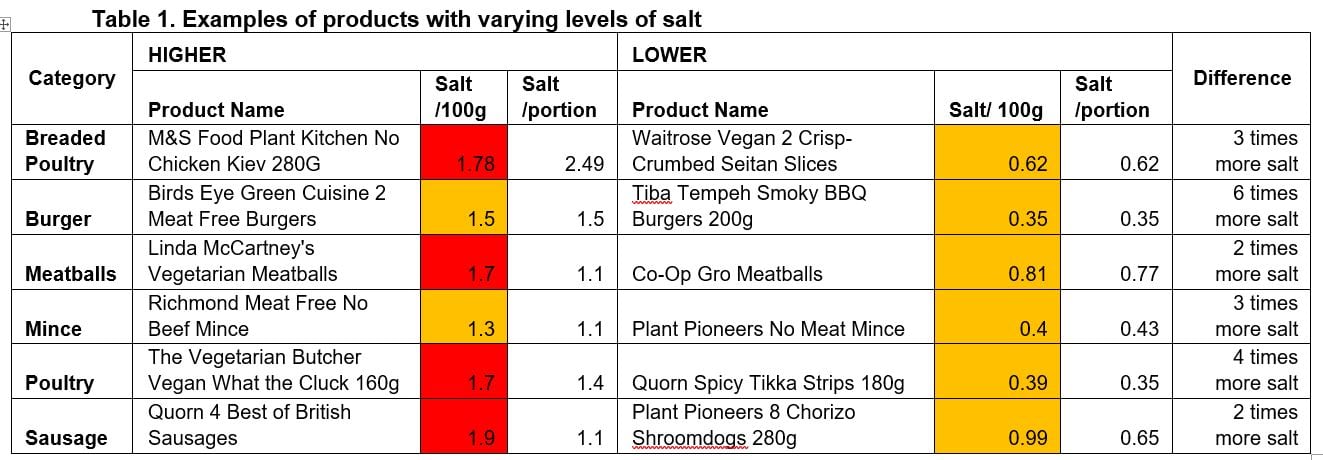Salt content in plant-based meat is significantly higher than in meat equivalents, with more than three in four plant-based meat products exceeding salt targets, according to health campaigner Action on Salt.
In what it called the first study to investigate the nutritional profile and overall healthiness of plant-based meat available in the UK, researchers from the group analysed 207 plant-based meat products against 226 meat products. Products were categorised into six main groups: sausages, burgers, plain poultry alternatives, breaded poultry alternatives, mince, and meatballs.
They found plant-based meat to have significantly fewer calories, total and saturated fat and more fibre than the meat equivalents. However, their salt content was significantly higher than meat in five out of six product categories.
The salt content of plant-based meat products was found to be ‘unnecessarily high’, the research said, with more than 75% of the products surveyed not meeting the UK government’s salt reduction targets.
Only two (surveyed) plant-based products would be considered low in salt with a green label on front of pack (i.e. <0.3g/100g), compared to 45 meat products.
According to the researchers, plant-based foods often have a perceived ‘health halo’ (i.e., a product is automatically assumed to be healthy simply because it is vegetarian or vegan). However, this research highlights that these foods can still be high in salt, they stated.
Overall, more than three in four plant-based products surveyed failed to meet their respective salt reduction targets – making it even more pertinent, said the campaigners, for the food industry to prioritise salt reduction: what they described as the most cost-effective strategy to improve public health.
The research also claimed to highlight how unnecessarily high in salt some products are, with similar products providing varying levels of salt content (see table below). The researchers said this clearly demonstrates that the salt content of these products can easily be reduced.
Action on Salt is now calling for the Government to reinstate a coherent salt reduction policy by mandating the salt targets so that all food manufacturers have to comply and give them a level playing field.

In response, a Birds Eye spokesperson said: "Plant-based protein sources play an increasingly important role in the health of both people and the planet, and our Green Cuisine range offers a range of nutritional benefits including being rich in protein, a source of fibre and iron. We have an active salt reduction programme in place aligned to the Department of Health 2024 targets to reduce salt on any individual product – in this case the Green Cuisine Burger – that does not currently meet our own strict salt targets."
Roberta Alessandrini, Researcher in Public Health Nutrition, Queen Mary University of London and lead author of the study said: “Plant-based meat is a healthier alternative to meat as it has fewer calories and less saturated fat. However, our data shows that salt levels in these products are unnecessarily high. Manufacturers have a vital role to play in providing consumers with products that are not only better for the planet and the animals but that are 100% healthy and low in salt."
Sonia Pombo, Campaign Manager for Action on Salt and co-author of the study, added: “This data shows the large variation in salt content of these products, with some food companies producing foods with up to six times more salt than their competitors. It’s no wonder we are all eating too much salt when food companies use it to such excess. Reducing salt is clearly possible; it’s time these companies acted more responsibly for the sake of our health.”
According to Action on Salt, salt is the major factor that puts up our blood pressure, with raised blood pressure responsible for 60% of all strokes and 50% of all heart disease, the biggest killers in the UK. The group claimed more than 2 million people a year die from eating too much salt. It also pointed to new research suggesting there is evidence that lower salt consumption and higher potassium intake is linked with lower risk of strokes and heart disease. While there is strong evidence that increasing salt intake causes a rise in blood pressure, few studies have suggested that lower salt intakes might be associated with increased mortality.
The study, published last month in the New England Journal of Medicine, also claimed to reaffirm that increasing potassium intake is linked to reducing strokes and heart disease. Potassium has an opposite effect in the body to salt – it can help relax blood vessels and lower blood pressure. Rich sources of potassium include fruits, leafy greens, beans and nuts.
Reference
Nutritional Quality of Plant-Based Meat Products Available in the UK: A Cross-Sectional Survey
Nutrients
https://doi.org/10.3390/nu13124225





